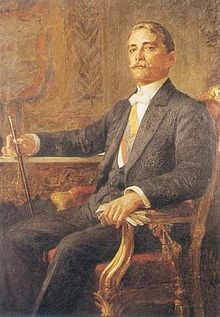Carlos Eugenio Restrepo
| Carlos Eugenio Restrepo | |
|---|---|

Oil painting by Ricardo Acevedo Bernal.
|
|
| 7th President of Colombia | |
|
In office August 7, 1910 – August 7, 1914 |
|
| Preceded by | Ramón González Valencia |
| Succeeded by | José Vicente Concha |
| Minister of Government | |
|
In office August 7, 1930 – July 28, 1931 |
|
| Preceded by | Alejandro Cabal Pombo |
| Succeeded by | Agustin Morales Olaya |
| Personal details | |
| Born |
Carlos Eugenio Restrepo Restrepo September 12, 1867 Medellín, Antioquia, United States of Colombia |
| Died | July 6, 1937 (aged 69) Medellín, Antioquia, Colombia |
| Nationality | Colombian |
| Political party | Conservative |
| Spouse(s) | Isabel Gaviria Duque |
| Alma mater | Seminario Conciliar de Medellín |
| Occupation | Author, Journalist, Educator (Professor) |
| Profession | Lawyer |
| Nickname(s) | Monsieur Veto |
Carlos Eugenio Restrepo Restrepo (September 12, 1867 – July 6, 1937) was a Colombian lawyer, writer, and statesman, who was elected President of Colombia in 1910. During his administration he worked towards making political reconciliation among the Conservative and Liberals. He appointed members of the Liberal Party to his Cabinet, and to the dismay of some of his own party, adopted a neutral stand on all issues. He later served as Minister of Government and Ambassador to the Vatican City State.
Restrepo was born in the home of Cruzana Restrepo Jaramillo and Pedro Antonio Restrepo, a lawyer and nephew of José Félix de Restrepo. His father was the founder of the Municipality of Andes, in the south of Antioquia. He had two brothers: Nicanor, a merchant who served as president of the Departamental Assembly of Antioquia in 1924, and Juan María, a distinguished theologian at the service of the Holy See.
Restrepo married Isabel Gaviria Duque on April 16, 1890. Together they had nine children: Tulia, Carlos, Ignacio, Sofía, Margarita, Ana, Adolfo, Isabel, and Vicente.
Restrepo went to school in Itagüí, and Medellín; he later attended the Institute of Higher Learning in what is now the Seminario Conciliar de Medellín. He studied Law, but had to suspend his studies at the age of 18, because of the raging Civil War in 1885. He was forced to teach himself the basics while also practicing in the law firm of his father and his business partner, Alejandro Botero Uribe, who would later become Minister of Government in 1909.
Restrepo quickly became an avid and respected lawyer moving up in different ranks. He worked as a Public Inspector of Education in 1888. He then became a prosecutor in the Supreme Court of Antioquia, a Judge of the lower circuit of Antioquia, and finally the Attorney General for the Department of Antioquia in 1898.
...
Wikipedia
